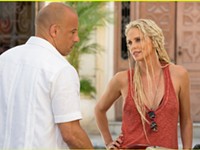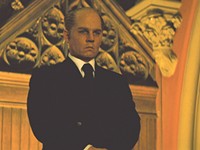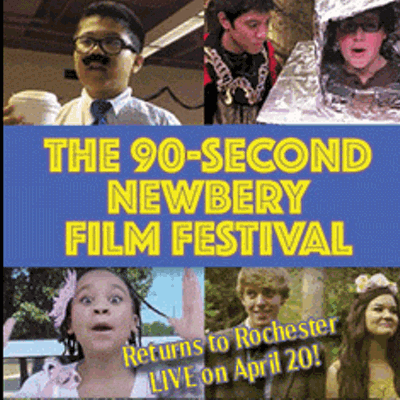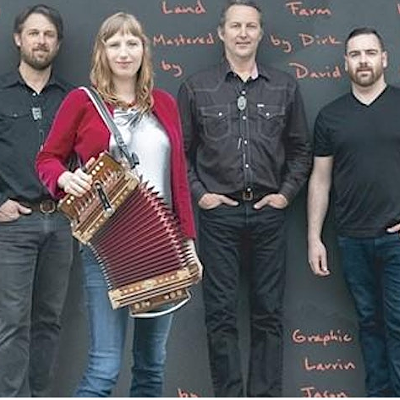[
{
"name": "500x250 Ad",
"insertPoint": "5",
"component": "15667920",
"parentWrapperClass": "",
"requiredCountToDisplay": "1"
}
]
Lawrence Kasdan didn't invent the ensemble drama, but he might as well have. His second film as a writer-director, 1983's "The Big Chill," has pretty much become the shorthand way to describe flicks with large casts confined to one location, complicated adult angst, and a Motown hit (or three) to which people may sing into a wooden spoon or do montage-y stuff.
But now it's 30 years later and Kasdan's take on baby-boomer frictions has evolved into the more privileged malaise of "Darling Companion," which uses the hunt for a lost dog as a jumping-off point for ruminations on aging, marriage, empty nesting, and positively uninspired storytelling.
A shrill, gesticulating Diane Keaton leads the otherwise excellent cast as Beth, who we meet as she's coping with separation anxiety from her eldest daughter and infant grandson. A surrogate child presents itself in the form of an injured dog along the side of the highway. Soon we've flashed forward a year, with the adorable mutt thriving in his new environment, and Beth's youngest (Elizabeth Moss, "Mad Men") conveniently married off to the handsome vet who convinced Beth to adopt Freeway.
It's immediately after the wedding that Beth's temporarily distracted husband, Joseph (Kevin Kline), loses the dog near their beautiful vacation home. The loss sends the despondent Beth into a screechy freefall of guilt-tripping aimed at Joseph, a hard-working surgeon against whom Beth has clearly been harboring decades of resentment.
A few wedding guests are still present, which allows search parties to ensue in various and cathartic combinations. Joseph's sister Penny (Dianne Wiest) is newly involved with Russell (Richard Jenkins), a chatty goofball intent on opening an English pub in Omaha, while Penny's doctor son Bryan (the increasingly ubiquitous Mark Duplass) undermines Russell when he's not whining about his absent girlfriend.
Kasdan and his co-writer wife, Meg, kill a few birds with one ridiculous stone by allowing Carmen (Ayelet Zurer, "Angels & Demons"), the dog's exotic caretaker and Bryan's potential love interest, to have psychic visions related to Freeway's whereabouts. "Darling Companion" tags along as everyone fans out over their little corner of the Rockies to air grievances, find common ground, and locate the elusive Freeway.
Now, pets hold an important place in our hearts; their unconditional love is one of life's little joys. So Beth's strong reaction to her lost dog isn't terribly off-base. But "Darling Companion" isn't about the mostly symbolic Freeway; it's about the obnoxiously sketched humans he ditched so they could work on their upper-middle-class issues.
That's obviously not to say that relationship troubles and the pitfalls of growing older are exclusive to the well off. It's just that the shallow script does these characters no favors, opting for condescension and cliché in lieu of honesty and insight, and hoping we might not notice if we're too busy oohing and aahing over the stunning mountain scenery.
But we can't help but notice, for instance, that Kline's Joseph seems like a decent guy: his only real crime is dedication to a career that's clearly provided very nicely for his family. This serves to make Keaton's Beth seem like a brooding harpy, even though we're meant to feel sympathy for her plight. And with Jenkins and Wiest nearly marginalized as daffy old flakes, the superficiality becomes infuriating, especially when the compelling truths of middle age are rarely explored on screen.
But the worst offense might be Zurer's Carmen: this film's version of what Spike Lee called the "magical Negro." Carmen is continually referred to as a gypsy, which I understood to be an ethnic slur. Maybe the term is O.K. to use if you're a rich whitey.
A plausible argument could be made that the greatest straight man in the history of cinema was actually a woman. Margaret Dumont, whose aristocratic sing-song belied the fact that she was born Daisy Baker in Brooklyn, served as the Marx brothers' foil in many movies: mugging in an exceedingly good-natured way to a parade of cheap shots from Groucho, Chico, and Harpo on such topics as her age and Amazonian stature. "I can see you now in a hot kitchen bending over the stove. But I can't see the stove," Rufus T. Firefly tells Mrs. Teasdale in the legendary "Duck Soup," which blends political satire with hilarious physical comedy and more than a couple pre-Code double entendres in the story of a financially troubled nation that goes to war. It's perhaps the Marx brothers' finest hour (and eight minutes).
Latest in Movie Reviews
More by Dayna Papaleo
-

Festival Preview: ImageOut 2017
Oct 4, 2017 -

Film review: 'The Fate of the Furious'
Apr 17, 2017 -

Rat tales
Sep 23, 2015 - More »




